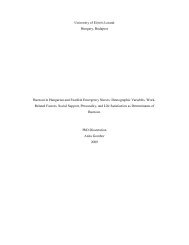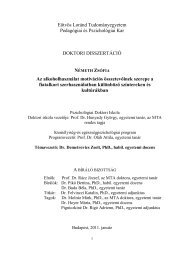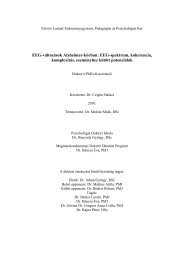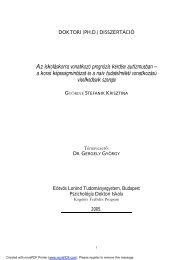értekezés tézisei - Pszichológiai Doktori Iskola - Eötvös Loránd ...
értekezés tézisei - Pszichológiai Doktori Iskola - Eötvös Loránd ...
értekezés tézisei - Pszichológiai Doktori Iskola - Eötvös Loránd ...
You also want an ePaper? Increase the reach of your titles
YUMPU automatically turns print PDFs into web optimized ePapers that Google loves.
Gignac, G. E; Palmer, B. R; Manocha, R; and Stough, C. (2005). An examination of the factor<br />
structure of the schutte self-report emotional intelligence (SSREI) scale via<br />
confirmatory factor analysis. Personality and Individual Differences, 39, 1029-1042.<br />
Goldenberg, I; Matheson, K; Mantler, J. (2006). The assessment of emotional intelligence: A<br />
comparison of performance-based and self-report methodologies. Journal of<br />
Personality Assessment, 86(1), 33-45.<br />
Goleman, D. (2002). Érzelmi intelligencia a munkahelyen. Budapest: Edge 2000 Kft.<br />
Goleman, D. (1997). Érzelmi intelligencia. Budapest: Háttér Kiadó.<br />
Isen, A. M; Daubman, K. A; & Nowicki, G P. (1987). Positive affect facilitates creative<br />
problem solving. Journal of Personality and Social Psychology, 52, 1122-1131.<br />
Isen, A. M. (1987). Positive affect, cognitive processes, and social behavior. In L. Berkowitz<br />
(Ed.), Advances in Experimental Social Psychology, 20 (pp. 203-253). New York<br />
Academic Press.<br />
Izard, C. E. (2001). Emotional intelligence or adaptive emotion? Emotion, 1(3), 249-257.<br />
Kaufman, A. S; Kaufman, J. C. (2001). Emotional intelligence as an aspect of general<br />
intelligence? What would David Wechsler say? Emotion, 1(3), 258-264.<br />
Lam, L. T; Kirby, S. L. (2002). Is emotional intelligence an advantage? An exploration of the<br />
impact of emotional and general intelligence on individual performance. The Journal<br />
of Social Psychology, 142(1), 133-143.<br />
Legree P. J; Psotka, J; Tremble, T; & Bourne D. R. (2005). Using consensus based<br />
measurement to assess emotional intelligence. In R. Schulze; R. D. Roberts (Eds.),<br />
Emotional intelligence. An International Handbook (pp. 155-180). Cambridge:<br />
Hogrefe & Huber Publishers.<br />
Lyons, J. B; Schneider, T. R. (2005). The influence of emotional intelligence on performance.<br />
Personality and Individual Differences, 39, 693-703.<br />
Matthews, G; Emo, A. K; Funke, G; Zeidner, M; Roberts, R. D; Costa, P. T. Jr. & Schulze, R.<br />
(2006). Emotional intelligence, personality and task-induced stress. Journal of<br />
Experimental Psychology, 12(2), 96-107.<br />
Mayer, J. D; Geher, G. (1996). Emotional intelligence and the identification of emotion.<br />
Intelligence, 22, 89-114.<br />
Mayer, J. D; Salovey, P. (1993). The intelligence of emotional intelligence. Intelligence, 17,<br />
443-450.<br />
Mayer, J. D; Salovey, P; Caruso, D. R; Sitarenios, G. (2001). Emotional intelligence as a<br />
standard intelligence (peer commentaries). Emotion, 1(3), 232-242.<br />
Mayer, J. D; Caruso, D. R; Salovey, P. (1999). Emotional intelligence meets traditional<br />
standards for emotional intelligence. Intelligence, 27(4), 267-298.<br />
Mayer, J. D; Mitchell, D. C. (1998). Intelligence as a subsystem of personality: From<br />
Sperman’s g to contemporary models of hot-processing. In W. Tomic; J. Kingma<br />
(Eds.), Advances in cognition and educational practice (pp. 43-75), Greenwich, CT:<br />
JAI Press.<br />
24







